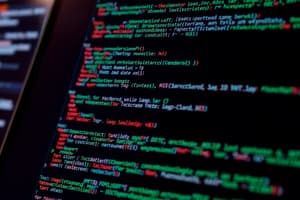Podcast
Questions and Answers
What does CPU stand for?
What does CPU stand for?
- Central Programming Unit
- Core Processing Unit
- Computer Processing Unit
- Central Processing Unit (correct)
What is the primary function of RAM in a computer?
What is the primary function of RAM in a computer?
- Permanent storage of files
- Displaying graphics
- Processing of instructions
- Temporary storage of data and programs (correct)
What is a variable in programming?
What is a variable in programming?
- A storage location for data (correct)
- A function name
- A fixed number in code
- A mathematical operator
What is the primary characteristic of a stack?
What is the primary characteristic of a stack?
Which device is used to connect multiple networks together?
Which device is used to connect multiple networks together?
What is SQL used for?
What is SQL used for?
What is phishing?
What is phishing?
What is the time complexity of Binary Search?
What is the time complexity of Binary Search?
Flashcards
What is the CPU?
What is the CPU?
The central processing unit (CPU) is the brain of a computer. It executes instructions, performs calculations, and manages all operations within a computer. It's like the conductor of an orchestra, directing all the different hardware components to work together.
What is RAM?
What is RAM?
Random Access Memory (RAM) is the computer's short-term memory. It stores data and programs that are currently being used by the computer. Think of it as the desk where you keep your current work. Once you turn off the computer, everything in RAM gets erased.
What is an operating system?
What is an operating system?
An operating system (OS) acts as the intermediary between the user and the computer's hardware. It manages resources like memory, storage, and input/output devices, and provides a platform for software to run on. It's like the air traffic controller of the computer, managing all the activities.
What is a stack?
What is a stack?
Signup and view all the flashcards
What is a queue?
What is a queue?
Signup and view all the flashcards
What is a primary key?
What is a primary key?
Signup and view all the flashcards
What is SQL?
What is SQL?
Signup and view all the flashcards
What is phishing?
What is phishing?
Signup and view all the flashcards
Study Notes
Section 1: General Computer Science
- CPU stands for Central Processing Unit.
- RAM's primary function is temporary storage of data and programs.
- An operating system controls hardware and software resources.
Section 2: Programming Basics
- The output of
print(3 + 5 * 2)in Python is 13. - HTML is not a programming language.
- A variable is a storage location for data.
Section 3: Data Structures
- A stack follows Last In, First Out (LIFO) order.
- A queue is used in Breadth-First Search.
- A linked list is a linear data structure.
Section 4: Networking
- HTTP stands for HyperText Transfer Protocol.
- A router connects multiple networks.
- DNS maps domain names to IP addresses.
Section 5: Databases
- A primary key uniquely identifies each record in a database.
- SQL is used for managing and querying databases.
Section 6: Cybersecurity
- Phishing is fraudulently obtaining sensitive information.
- A firewall controls network traffic.
Section 7: Algorithms
- Binary search has a time complexity of O(log n).
- An algorithm is a step-by-step solution to a problem.
Studying That Suits You
Use AI to generate personalized quizzes and flashcards to suit your learning preferences.




